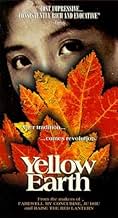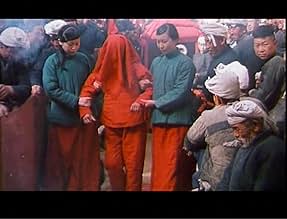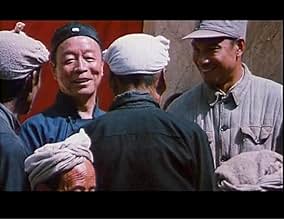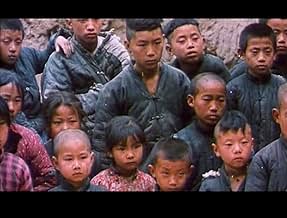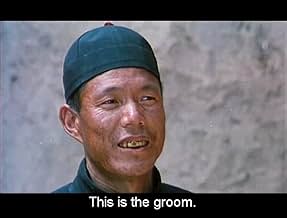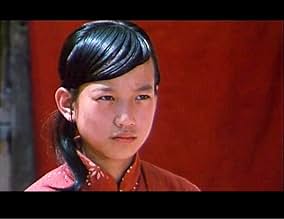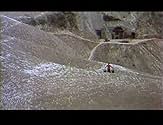IMDb RATING
7.1/10
2.7K
YOUR RATING
A communist soldier travels to Shanbei to collect folk songs for propaganda while visiting a poor peasant family, giving hope to the teenage daughter in escaping an arranged marriage.A communist soldier travels to Shanbei to collect folk songs for propaganda while visiting a poor peasant family, giving hope to the teenage daughter in escaping an arranged marriage.A communist soldier travels to Shanbei to collect folk songs for propaganda while visiting a poor peasant family, giving hope to the teenage daughter in escaping an arranged marriage.
- Awards
- 8 wins & 5 nominations total
- Director
- Writers
- All cast & crew
- Production, box office & more at IMDbPro
Featured review
Yellow Earth by Chen Kai-ge (Farewell My Concubine, Life on a String) was the first film of the so-called fifth generation of filmmakers who introduced a new aesthetic and social awareness to Chinese cinema. It is set just before World War II in Shaanxi province in Northern China near the Yellow River, an area referred to as gian shan wan he (thousands of hills and ten folds more gullies). Based on Ke Lai's novel, "Echo in the Deep Valley", the film shows the struggle of the peasants in the area known for its unyielding harshness and the folk traditions they drew on to express their anguish. As the film begins, cinematographer Zhang Yimou creates a feeling of desolation with panoramic shots of the vast landscape as a soldier from the Communist Eighth Route Army, Gu Qing (Wang Xueyin), walks over the barren hills to a small village. He says he is there to collect folk songs for the army to use so that "the people will know why they are suffering, why their women are beaten, and why they should rise up".
Comrade Gu stays with a poor family that includes 47-year old widowed father (Tan Tuo), his 13-year old daughter Cuiqiao (Xue Bai), and almost mute son Hanhan (Liu Quiang). Rather than relying on traditional narrative to convey the film's message, Kai ge uses long static shots and songs of the people to express mood and tone. The father has become embittered with his life of constant deprivation and sings "Life is hard for seasonal workers. They are hired in January, dismissed in October". Conditions are tough and the farmers pray for rain to alleviate the drought but there is no rain. At a wedding, the serving of wooden fish figures covered with sauce underscores the lack of adequate food. The film also dramatizes the sorry condition of women, showing how they had to carry heavy buckets of water on their backs for miles, and how they were forced into arranged marriages at a very young age.
Gu is seemingly confident of the fight he is waging. He lets the family know that in the South, there are no longer any arranged marriages and tells Cuiqiao about women who cut their hair, fight against the Japanese, and can read and write. She hears about her older sister's unhappy marriage and does not want to endure the same fate. "Of all us poor folk," she sings, "girls are the saddest." Cuiqiao is infatuated with Gu and wants to leave home and join the Army 200 miles away in Yanan. She knows that if she stays she will be forced to marry an older man in an arranged ceremony. When Gu leaves to return to camp, he promises to return in April. Promises alone, however, cannot change Cuiqiao's growing feeling of entrapment or the terrible consequences that follow. In its heartbreaking portrayal of people caught in lives of "quiet desperation" that even Communist ideas or marching songs cannot redeem, Yellow Earth speaks a universal language.
Comrade Gu stays with a poor family that includes 47-year old widowed father (Tan Tuo), his 13-year old daughter Cuiqiao (Xue Bai), and almost mute son Hanhan (Liu Quiang). Rather than relying on traditional narrative to convey the film's message, Kai ge uses long static shots and songs of the people to express mood and tone. The father has become embittered with his life of constant deprivation and sings "Life is hard for seasonal workers. They are hired in January, dismissed in October". Conditions are tough and the farmers pray for rain to alleviate the drought but there is no rain. At a wedding, the serving of wooden fish figures covered with sauce underscores the lack of adequate food. The film also dramatizes the sorry condition of women, showing how they had to carry heavy buckets of water on their backs for miles, and how they were forced into arranged marriages at a very young age.
Gu is seemingly confident of the fight he is waging. He lets the family know that in the South, there are no longer any arranged marriages and tells Cuiqiao about women who cut their hair, fight against the Japanese, and can read and write. She hears about her older sister's unhappy marriage and does not want to endure the same fate. "Of all us poor folk," she sings, "girls are the saddest." Cuiqiao is infatuated with Gu and wants to leave home and join the Army 200 miles away in Yanan. She knows that if she stays she will be forced to marry an older man in an arranged ceremony. When Gu leaves to return to camp, he promises to return in April. Promises alone, however, cannot change Cuiqiao's growing feeling of entrapment or the terrible consequences that follow. In its heartbreaking portrayal of people caught in lives of "quiet desperation" that even Communist ideas or marching songs cannot redeem, Yellow Earth speaks a universal language.
- howard.schumann
- May 25, 2003
- Permalink
Storyline
Did you know
- TriviaThe film was filmed near Yan'An, which is considered the motherland of the Chinese cultural revolution.
- ConnectionsFeatured in The Story of Film: An Odyssey: Fight the Power: Protest in Film (2011)
- How long is Yellow Earth?Powered by Alexa
Details
- Release date
- Country of origin
- Language
- Also known as
- Yellow Earth
- Production company
- See more company credits at IMDbPro
Contribute to this page
Suggest an edit or add missing content



